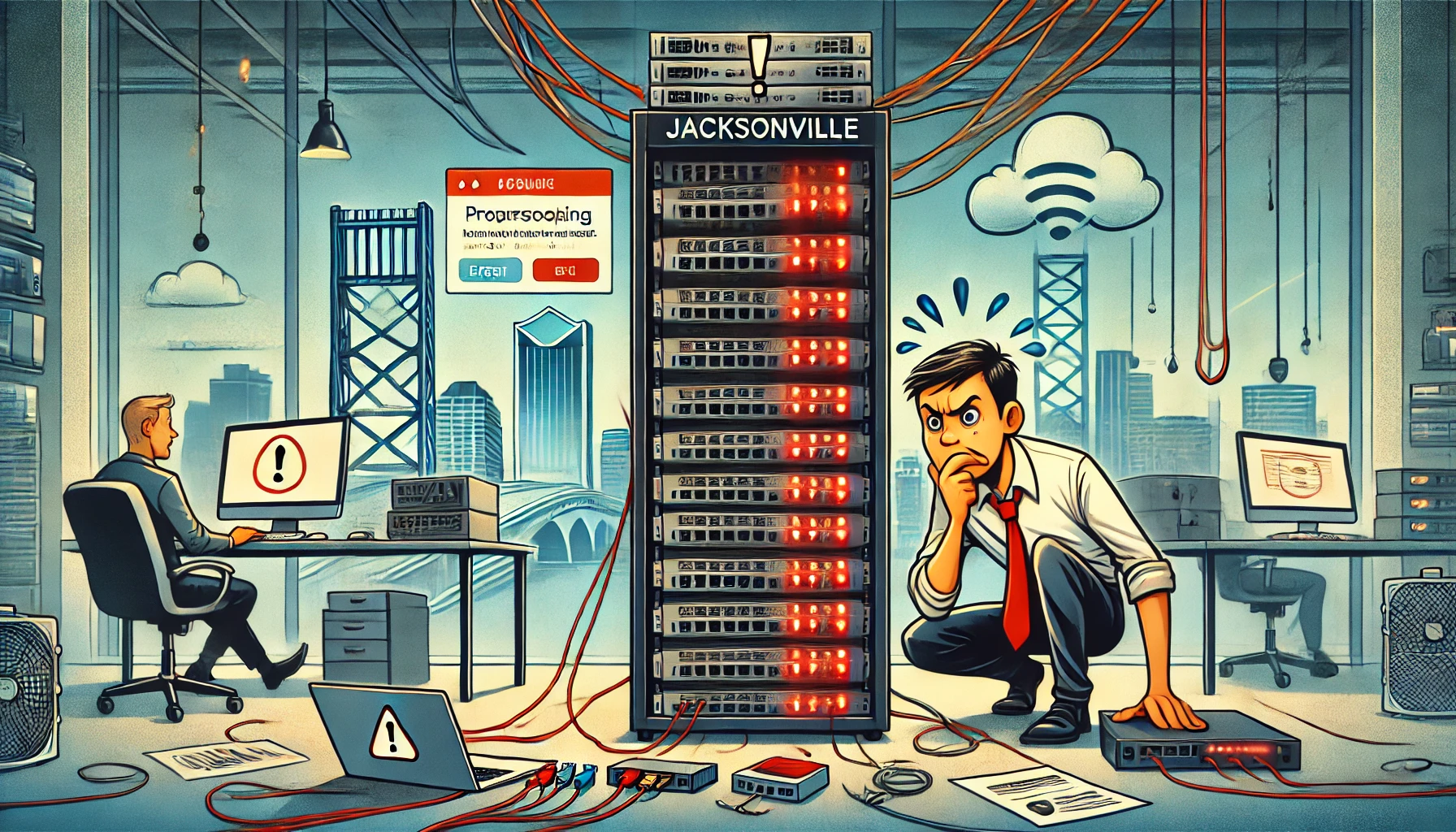The foundation of any organization in the connected world of today is its computer network. When something goes wrong, it can affect public trust, productivity, and operations. The Jacksonville computer network issue recently attracted a lot of attention since it revealed weaknesses in the community’s IT infrastructure.
This blog explores the incident’s causes, network effects, and takeaways for IT workers everywhere.
Let’s dive in…
What Are the Network Problems in Jacksonville?
Jacksonville’s computer network has a number of issues that impact people’s day-to-day lives. Frequent outages—when the internet suddenly stops functioning for a while—are a significant problem. These outages interfere with important communication as well as work and study.
Slow internet speeds are another issue that makes it difficult to stream videos, upload or download files, or browse websites. Many locals also worry about security breaches that may risk their personal data, like hacking or phishing attacks.
These problems vary in frequency and duration. Slow speeds are one issue that can arise virtually every day. Others, such as security breaches or network outages, may occur less frequently but disrupt operations more significantly when they do. Numerous areas are affected by these issues, but Jacksonville’s underprivileged areas and rural neighborhoods typically experience the worst outcomes. Because they may not have access to the newest services or technology, people in lower-income communities are more likely to experience these issues.
Outdated infrastructure, such as old cables or equipment that cannot handle modern internet demands, is one possible source of these network issues. Technical flaws, such as equipment failures and cyberattacks that target security system errors, can also cause issues. Addressing these issues can help Jacksonville’s network become more reliable for everyone.
The Current Jacksonville’s IT Infrastructure
From essential business operations to personal internet use, Jacksonville’s computer network infrastructure serves as the foundation for everyday activities. However, to comprehend the difficulties and potential for enhancement, some of the current system’s elements merit a closer look.
1. Internet Service Providers (ISPs)
Jacksonville is home to both smaller local providers and major national ISPs. Although residents have a variety of options thanks to this diversity, the quality of services varies throughout the region. High-speed broadband access is available in some neighborhoods, while outdated infrastructure in others results in slower connections or fewer options.
2. Fiber-Optic Connectivity
In Jacksonville, fiber-optic technology, which provides faster and more dependable internet, is not yet widely available. Many residential areas rely on outdated DSL or cable connections, even though some areas—particularly commercial zones—have fiber-optic installations. There is a digital divide between people with and without high-performance internet as a result of this discrepancy.
3. Public Wi-Fi and Community Access
There are public Wi-Fi networks in a number of Jacksonville locations, including community centers, parks, and libraries. But for frequent use, their accessibility and speed are frequently inadequate. Instead of being a dependable system for consistent connectivity, they primarily function as a necessary resource.
4. Aging Infrastructure
Older hardware and systems that can’t keep up with the demands of modern connectivity make up a large portion of Jacksonville’s network infrastructure. Updates are necessary to effectively manage growing data traffic because problems like slow network speeds and frequent outages are frequently caused by outdated routers, cables, and server technology.
5. Urban versus Rural Disparities
Compared to rural outskirts, Jacksonville’s urban areas typically offer more sophisticated connectivity options. These communities’ prospects for education, remote work, and business expansion are hampered by the latter’s frequent lack of high-speed internet access.
6. Response to Network Issues
Local ISPs occasionally experience delays in reacting to and fixing problems when there are internet outages. Users may have to wait a long time for repairs, which can cause them to lose internet access. This reactive approach to network upkeep emphasizes the necessity of more proactive tactics and infrastructure surveillance.
7. Community Initiatives
In Jacksonville, there have been some encouraging community projects aimed at enhancing network connectivity. Local governments and organizations, for example, have endeavored to increase the number of reasonably priced internet options and raise residents’ level of digital literacy. Although these efforts are encouraging, their funding and scope are still constrained.
8. Cybersecurity Concerns
As more people depend on networks for both personal and professional purposes, cybersecurity has grown in significance. Jacksonville users are susceptible to online dangers like phishing and hacking since many lack access to strong security measures. Improving the infrastructure as a whole requires strengthening cybersecurity.
Moving Forward
The community, local government, and internet providers must work together to address these issues. Important first steps include making investments in fiber-optic connectivity expansion, infrastructure modernization, and equitable access for all regions, including rural communities. Jacksonville can create a more robust, dependable computer network structure that benefits everyone by carefully solving these problems.
The Impact of the Network Disruption in Jacksonville
1. Operational Downtime
City departments faced severe operational difficulties as a result of the network outage. Residents were irritated and important tasks were delayed as a result of the suspension of services like vehicle tag processing at the Duval County Tax Office. Even after partial restoration, internal systems at organizations such as the Public Defender’s Office continued to require troubleshooting.
When IT systems are unavailable, it can lead to:
- Delayed public services: Online transactions and access to vital information were unavailable to residents.
- Increased workload: Manual procedures added stress for workers already handling heavy workloads.
2. Economic Implications
Network issues frequently result in financial losses for businesses as a result of failed operations and relocation of resources for troubleshooting. As for Jacksonville:
- Permits and documentation for businesses that depended on city services were delayed.
- The city had to pay for emergency response and repair vendor consultations.
3. Security Concerns
While officials stated there was no cyber-attack, the lengthy outages raised concerns about potential vulnerabilities in Jacksonville’s IT infrastructure. If hardware or configuration flaws are not addressed quickly, they can open the door for malicious actors.
Common Causes for Network Problems
The Jacksonville case serves as a reminder that there are several possible causes of network issues:
1. Hardware Failures
A major contributor to outages, as observed in Jacksonville, is outdated or broken hardware. Unexpected failures of servers, switches, or routers can cause whole networks to malfunction.
2. Configuration Errors
Connection issues or service outages are frequently caused by misconfigured devices. For instance, improper router or firewall configuration can prevent access to vital resources.
3. Bandwidth Limitations
As the use of cloud-based apps and remote work arrangements grows, networks may become overloaded with traffic, leading to lag or outages.
4. Environmental Factors
Jacksonville’s vulnerability to severe weather, such as hurricanes, can harm physical infrastructure like cables and data centers.
Lessons from Jacksonville: IT Resilience and Crisis Management
IT professionals around the world can use the Jacksonville computer network problem as a case study:
- Understand Local Contexts: Make sure your strategies are tailored to local challenges, whether they are weather risks elsewhere or aging infrastructure in Jacksonville.
- Prioritize Resilience: Create networks that can withstand external threats like cyberattacks as well as technical malfunctions.
- Collaborate with Vendors: Good relationships with ISPs and hardware providers ensure quicker crisis resolution.
- The Key to Effective Maintenance: It is necessary to perform regular hardware and software maintenance to avoid unforeseen malfunctions. Regular inspections should be planned by organizations to identify potential issues before they get worse.
- Invest in Redundancy: When primary systems fail, redundancy makes sure that backups take over. Cloud-based solutions or backup servers can reduce downtime when hardware fails. Implementing failover mechanisms ensures that operations continue even during disruptions.
- Improve Monitoring Systems: IT teams are able to address anomalies before they affect users thanks to advanced monitoring tools that can identify them early. Long-term outages can be avoided with real-time alerts for hardware health, latency spikes, and bandwidth usage.
- Enhance Communication During Crises: Transparency is essential to preserving employee morale and public trust during network outages:
- Give frequent updates on the progress of problem-solving efforts.
- Until systems are restored, provide alternate solutions (such as manual procedures).
How to Solve Jacksonville Computer Network Issues Right Now (2025)
It will take careful preparation and cooperation to resolve Jacksonville’s computer network issues. The following are some important approaches to resolving the problems:
1. Upgrading Infrastructure with Advanced Technology
Upgrading the network’s infrastructure is one of the most crucial actions. This entails swapping out antiquated systems for more recent models that are more capable of handling larger volumes of data and operating more effectively. 5G networks, fiber-optic cables, and high-speed routers can all greatly increase speed and dependability. These contemporary technologies will lower the risk of downtime while guaranteeing constant and secure connectivity.
2. Strengthening Cybersecurity
Another important solution is to enhance network security. Malware and hacking are examples of cyberattacks that can impede internet access and steal private data. Jacksonville can strengthen cybersecurity measures like firewalls, encryption, and frequent software updates to better safeguard its network. Maintaining security requires training staff to identify online dangers, like phishing scams.
3. Working Together as a Community
No single group can solve these network issues alone—collaboration is essential. Government leaders, private internet companies, and local communities must work together to develop effective solutions. Private companies offer knowledge and cutting-edge technology, while the government can finance and help with infrastructure improvements. Communities must voice their specific needs to ensure fair access and long-term improvements for all.
Jacksonville can create a more quickly, more secure computer system that will meet the needs of its citizens both now and in the future by concentrating on these solutions.
Conclusion
The Jacksonville computer network problem acts as a reminder that even seemingly small technical issues can have a big impact on public trust, operations, and finances. It draws attention to the significance of proactive maintenance, strong redundancy procedures, and successful crisis communication tactics for IT workers.
Organizations can protect their networks from future disruptions and guarantee dependability in an increasingly digital world by adopting best practices and learning from such incidents.
Remember: For modern organizations, having a robust network is essential, not just a benefit.
FAQs: Jacksonville Computer Network Issue












